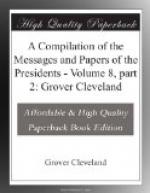Congress, not probably adverting to the difference between the militia and the Regular Army, by the act of March 3, 1807, authorized the President to use the land and naval forces of the United States for the same purposes for which he might call forth the militia, and subject to the same proclamation. But the power of the President under the Constitution, as Commander of the Army and Navy, is general, and his duty to see the laws faithfully executed is general and positive; and the act of 1807 ought not to be construed as evincing any disposition in Congress to limit or restrain this constitutional authority. For greater certainty, however, it may be well that Congress should modify or explain this act in regard to its provisions for the employment of the Army and Navy of the United States, as well as that in regard to calling forth the militia. It is supposed not to be doubtful that all citizens, whether enrolled in the militia or not, may be summoned as members of the posse comitatus, either by the marshal or a commissioner according to law, and that it is their duty to obey such summons. But perhaps it may be doubted whether the marshal or a commissioner can summon as the posse comitatus an organized militia force, acting under its own appropriate officers, without the consent of such officers. This point may deserve the consideration of Congress.
I use this occasion to repeat the assurance that so far as depends on me the laws shall be faithfully executed and all forcible opposition to them suppressed; and to this end I am prepared to exercise, whenever it may become necessary, the power constitutionally vested in me to the fullest extent. I am fully persuaded that the great majority of the people of this country are warmly and strongly attached to the Constitution, the preservation of the Union, the just support of the Government, and the maintenance of the authority of law. I am persuaded that their earnest wishes and the line of my constitutional duty entirely concur, and I doubt not firmness, moderation, and prudence, strengthened and animated by the general opinion of the people, will prevent the repetition of occurrences disturbing the public peace and reprobated by all good men.
MILLARD FILLMORE
WASHINGTON, February 25, 1851.
To the Senate of the United States:
I transmit to the Senate, for its consideration with a view to ratification, a convention between the United States and the Mexican Republic for the protection of a transit way across the Isthmus of Tehuantepec, signed in the City of Mexico on the 25th ultimo.
Accompanying the treaty is a letter from Mr. P.A. Hargous, the present proprietor and holder of the privileges granted by Mexico, signifying his assent to and acceptance of the terms of its provisions. There is also an abstract of title to him from the original grantee and copies of the several powers and conveyances by which that title is derived to him. It may be well that these papers should be returned to be deposited among the archives of the Department of State.




